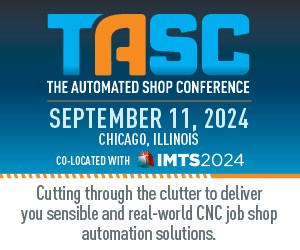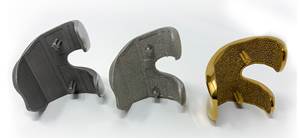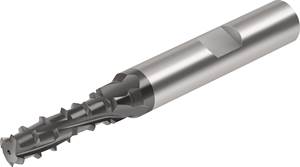10 Reasons Why Machine Shops Vary So Much in Quoted Pricing
Many factors explain the potential 10X variation in different shops’ bids for the same machining work.
I recently assisted in a project conducted by Gardner Intelligence, the research group within Modern Machine Shop publisher Gardner Business Media, which involved analyzing the machining costs of various part types. I asked several shops to provide quotes on certain parts, and thus encountered the predicament that buyers of machined parts routinely see: a wide range of prices. There is no simple answer to the question, “How much does it cost to machine this part?”
MakeTime has seen the same thing. This company, which is in the business of matching shops with customers, cites research finding a factor-of-10 discrepancy in quoted prices for identical machining work. Aiming to simplify costing, the company recently introduced a “network pricing” feature that can estimate a part’s machining cost based on MakeTime’s history and analysis of the costing of similar parts.
I recently asked MakeTime Director of Fulfillment Justin Hosley about the pricing discrepancy. Having previously worked in business development for a machine shop, he holds the view that there is no single explanation, but instead a variety of factors. His list is below, followed by a few additions of mine. Why do shops’ prices differ widely? Here are some reasons:
1. Capabilities. Many shops could make the part to print, but not all would employ equally sophisticated resources. The difference between five-axis machining and many setups on a simple mill affects price. So does the presence of in-house grinding rather than outsourcing this work.
2. Regionality. The presence of certain industries in a region bids up the local price. A shop in a rural area might comfortably quote a lower price than a shop in an area full of aerospace suppliers.
3. Capacity. Busy shops bid higher. (Since MakeTime’s pricing model is based on current open capacity, it sees this variation every day.)
4. Interpretation. Two shops can interpret the same job differently. The one that knows the customer well might know that some details of the print do not matter. The new supplier does not know what to ignore.
5. Automation. On higher-volume jobs, differences in labor cost affect pricing substantially.
6. Process. The experienced or clever engineer or machinist might see a more efficient way to set up or run the job than other bidders.
7. Relationships. Mr. Hosley has experienced this one. The 60-year-old shop he worked for could get better pricing on material than other, newer shops.
That is his list. I will add three more of my own:
8. Envelope. A given shop frequently is best adapted to run parts within a given size range, whether large or small. Competitively running parts outside this scale is difficult.
9. Qualification. If a shop has the assets qualifying it for a specific industry—think auditing staff, special machines or inspection capabilities—then it seeks to cover the cost of these assets even in work outside of that industry.
10. Error. Shops make mistakes in their quoting. Sometimes the reason behind a low bid is simply a shop that will be fortunate not to win that job.
Related Content
4 Ways 3D Printing Is Changing Medical Implants
Additive manufacturing provides new ways of making medical implants, but its impact is greater than this. How 3D printing is changing medical manufacturing and improving patient outcomes.
Read More8 Ways to Increase Productivity on the Manufacturing Floor
When it comes to machine shop productivity, continuous improvement depends on efficient employees, equipment and processes.
Read More6 Variations That Kill Productivity
The act of qualifying CNC programs is largely related to eliminating variations, which can be a daunting task when you consider how many things can change from one time a job is run to the next.
Read MoreSelecting a Thread Mill That Matches Your Needs
Threading tools with the flexibility to thread a broad variety of holes provide the agility many shops need to stay competitive. They may be the only solution for many difficult materials.
Read MoreRead Next
The Automation Event for CNC Machine Shops
Get sensible, real-world automation solutions during this half-day workshop co-located with IMTS 2024.
Read MoreContinuous Improvement and New Functionality Are the Name of the Game
Mastercam 2025 incorporates big advancements and small — all based on customer feedback and the company’s commitment to keeping its signature product best in class.
Read MoreThe Future of High Feed Milling in Modern Manufacturing
Achieve higher metal removal rates and enhanced predictability with ISCAR’s advanced high-feed milling tools — optimized for today’s competitive global market.
Read More










.jpg;maxWidth=300;quality=90)















